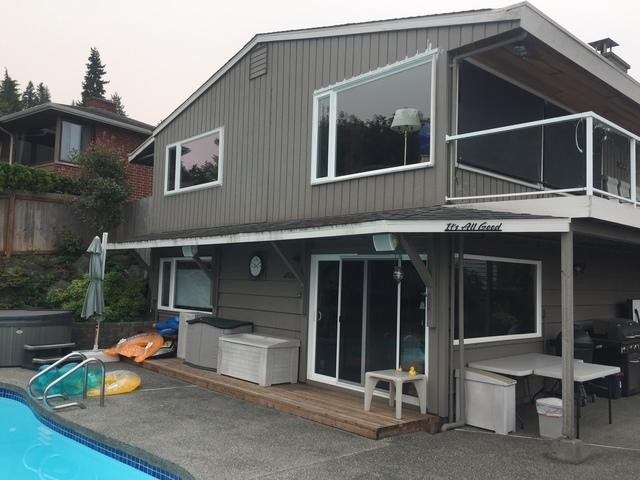When it’s time to replace your siding or roofing, you want to make sure you’re getting a fair price for quality work. Unfortunately, some untrustworthy contractors may overcharge homeowners who aren’t familiar with market rates or the details of the job.
Price is the number one concern for homeowners when looking to start a new home improvement project. If you get started on a project without following these steps first, you could end up paying a high price for low quality work.
Here’s how to protect yourself and avoid paying a premium price for subpar work:
1. Get Multiple Estimates
One of the best ways to avoid being overcharged is to gather multiple quotes from different contractors.
Aim for at least three estimates to compare pricing, materials, and labor costs. If one quote is significantly higher than the others, ask why—there may be a valid reason, such as higher-quality materials or a more experienced crew, but it could also be an indication of price gouging.
2. Beware of High-Pressure Sales Tactics
Some contractors use high-pressure sales techniques to rush homeowners into signing contracts before they’ve had time to think things through. Be wary of statements like:
“This price is only good for today!”
“You need to sign now to get this discount.”
“Your home is in immediate danger if you don’t act fast.”
A reputable contractor will give you time to make an informed decision.
3. Check for Hidden Fees
Some companies advertise low initial prices but add hidden fees once the project begins. Ensure that your contract clearly outlines all costs, including:
Labor
Materials
Permit fees
Disposal fees
Additional repairs (if needed)
Ask about any potential extra charges and make sure they’re in writing before signing. Some costs may come up that are outside of the original contract:
For instance, what happens if the contractor removes your siding and finds your underlayment is rotten? Some contractors may not cover issues like this and leave you responsible for fixing it before they can continue working. Others may consider this a change of scope, and others may cover the cost of rot remediation for free.
Ask ahead of signing a contract and be sure to read any fine print.
4. Verify Licensing and Insurance
A trustworthy contractor should be licensed and insured. Before hiring, ask for proof of both and check their credentials with your state’s licensing board.
Unlicensed or uninsured contractors might offer lower prices but could cut corners, leading to costly issues down the line.
5. Read Reviews and Ask Around
Online reviews on platforms like Google, Yelp, and the Better Business Bureau (BBB) can provide insight into a contractor’s reputation.
If you know anyone who’s also had work done on their exterior, ask them for firsthand advice.
6. Understand Quality
Higher-quality materials will naturally come at a higher price, but some contractors may charge premium prices for subpar products. Research different roofing and siding materials, including their lifespan, durability, and cost.
This can also be said for contractors charging you a higher price for high-quality materials but not installing it properly. This can affect the lifespan, warranty, and cost you more money down the road.
If a contractor is charging significantly more for a material than the market rate, they may be inflating prices unnecessarily.
7. Watch Out for Unnecessary Upgrades
Some contractors may try to upsell unnecessary upgrades that drive up the price of your project.
While improvements like premium underlayment or specialty coatings can be beneficial, make sure they’re truly needed for your home and not just padding the bill.
For example: a siding contractor insists on adding extra insulation or a specialized weather barrier that isn't necessary for your home’s climate. While these upgrades might have some benefits, they may not justify the steep increase in price - especially if your home already has adequate insulation.
An honest contractor will check your home’s insulation before adding it to the bill. Always research the recommended upgrades and ask whether they are truly necessary or just an attempt to boost the project’s cost.
8. Review the Warranty
An ethical contractor should provide warranties for both materials and labor. Compare warranties between contractors to ensure you’re not overpaying for minimal coverage.
A strong warranty can indicate confidence in workmanship and materials, protecting you from unexpected costs in the future. Red flag if the contractor doesn’t offer either warranties.
9. Trust Your Instincts
If a contractor’s pricing seems suspiciously high or something feels off about their approach, don’t hesitate to walk away. A reliable professional will be transparent about costs, timelines, and expectations. If it sounds too good to be true, it probably is.
Get the Improvements, Avoid the Hassle
Home improvements like siding and roofing replacements are significant investments, so it’s essential to ensure you’re getting a fair price.
By obtaining multiple estimates, researching costs, and staying vigilant for potential red flags, you can confidently hire a contractor without fear of being overcharged.
Taking these steps will help you secure a high-quality job at a reasonable price, giving you peace of mind and a well-protected home for years to come.
Subscribe to Pacific Exteriors LLC's Blog








Comments